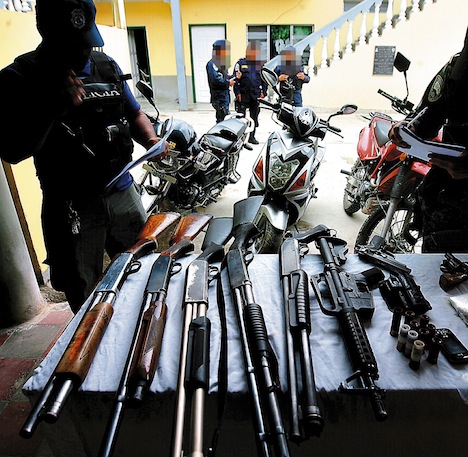I write today in The New Republic about the role that firearms play in Honduras’s security issue — the country has the world’s highest homicide rate, and nearly 80% of those homicides are committed by means of small arms, such as pistols, revolvers, shotguns, and rifles.![]()
Despite some changes to Honduran gun laws in the early and mid-2000s, however, gun laws remain relative lax in Honduras. Each person is permitted to own up to five firearms and while open and concealed carry, and the ownership of assault weapons, are both technically illegal, enforcement of gun laws is sporadic at best. Even more troubling is a corrupt police force that’s been reported to prey on some of the weakest groups in — labor activists, LGBT activists, indigenous activists and just the downright impoverished.
You might expect each of Honduras’s top presidential candidates — perhaps, most especially, leftist Xiomara Castro de Zelaya — would be in support of a strong push to restrict gun ownership, but it’s just not the case — even though security is the top issue, by far, in the Honduran election. In many ways, the chances for significant gun control laws in Honduras are even more pessimistic than in the United States, where even a bipartisan push earlier this year failed to enact even mild background checks in the aftermath of the December 2012 Newtown elementary school shooting.
Rasel Tomé, an activist who joined with the Zelayas to found Honduras’s new leftist party, Libre (the Party of Liberty and Refoundation), has high hopes for a wide array of progressive legislation if Zelaya wins Sunday’s election. But even Tomé doesn’t dare to list gun-control legislation on his wish list of potential policy highlights for the next four years—he argues that in a country where the government has so thoroughly and historically failed to respect human rights, the state can hardly be trusted to ask its citizens to disarm. “If the people were disarmed, they would feel vulnerable to abuses and infringements,” Tomé said. “Right now, when there’s such a culture of suspicion, what has [outgoing president Porfirio] Lobo Sosa’s government done so that people feel their human rights can be respected? Can you go to the public forces and feel that they will protect you? They won’t because there’s so much impunity. So it’s not the right moment to bring that topic to the forefront of the debate.”
The Honduran constitution doesn’t enshrine a “right to bear arms” like the 2nd Amendment does, but gun laws have been historically lax in Honduras. The chief restriction is a law that limits an individual to owning just five firearms, but that’s lightly enforced at best. Successive governments in the 2000s theoretically tightened Honduran gun laws—a national registry was created in 2002, assault weapons were banned in 2003, and it’s been technically illegal to carry guns (openly or concealed) in public since 2007. But in a country where officials lack the power even to investigate every murder, and where many citizens carry weapons for personal protection, those restrictions aren’t rigorously enforced. Moreover, those laws don’t apply to the police, who have been accused of perpetrating a troubling amount of the violence directed at Hondurans, especially the most vulnerable groups. But many Hondurans today believe that the U.S. is partially responsible for Honduras’s gun problem. They attribute the high rate of firearm ownership to the glut of weapons that flooded the country in the 1980s when the Reagan administration armed the Contras from within Honduras in an attempt to push the Soviet-backed Sandinistas out of power in Nicaragua to the south. Just as the United States gave its blessing to the transfer of weapons from Qatar to anti-regime Libyans in 2011 that may have subsequently found their way into the hands of Tuareg separatists (or worse) in northern Mali in 2012, U.S.-sourced firearms in the 1980s intended for the Contras have now found their way into the hands of the gangs that control the most dangerous parts of Honduras’s capital, Tegucigalpa, its industrial center of San Pedro Sula, and its Caribbean coast. But in recent years, a swarm of illicit arms have also entered Honduras from Mexico and other parts of Central America as part of the illegal drug trade.
